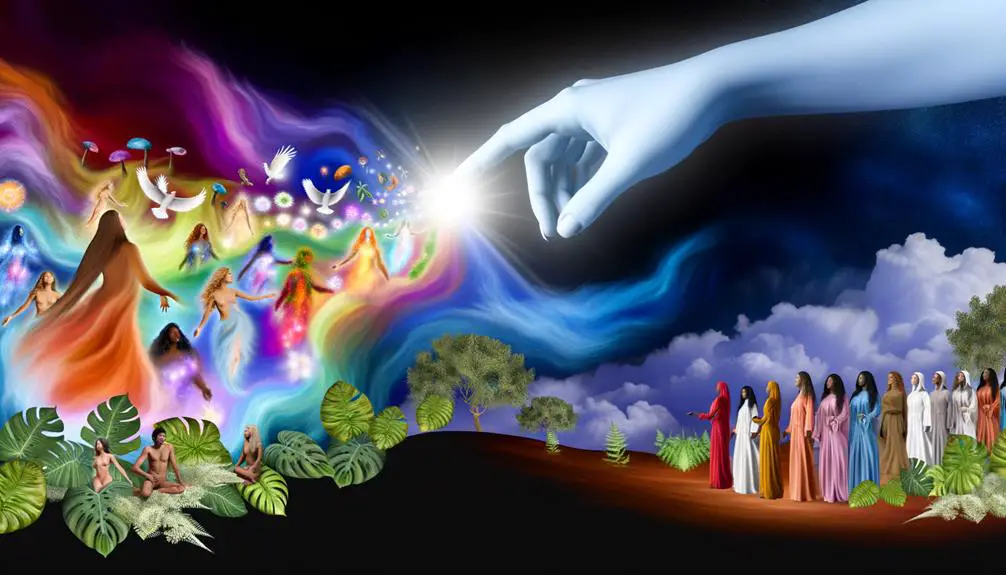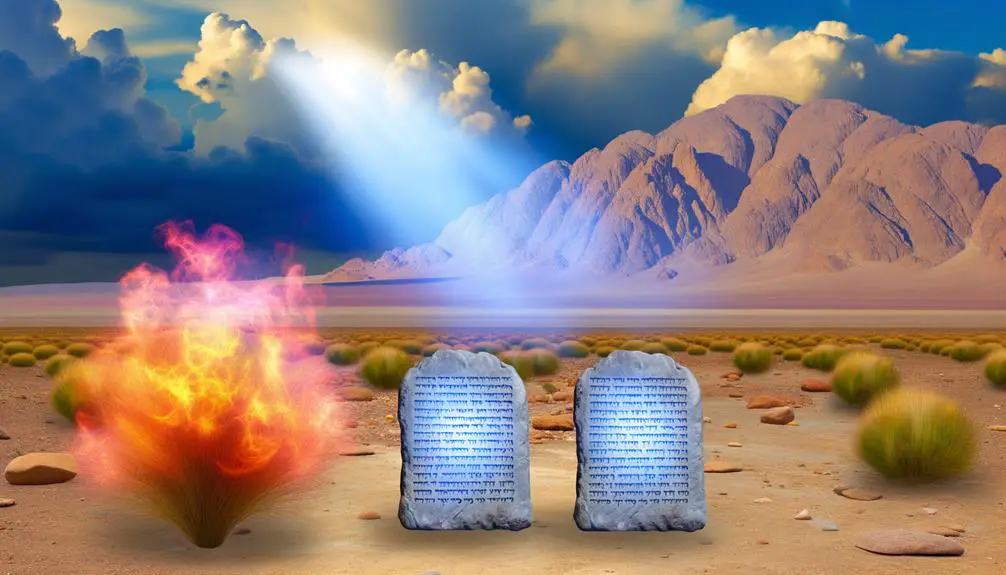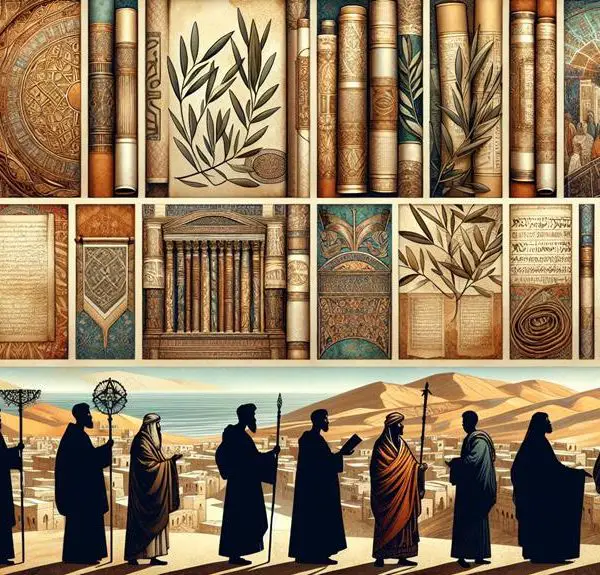Navigate a comprehensive list of Biblical decrees, exploring how ancient commands shape modern beliefs and practices—discover more inside.

List of Decrees in the Bible
Did you know that the Bible mentions over 1,000 decrees, commands, and promises? From the Creation decrees that set the universe into motion to the intricate laws given to Moses, the Bible's range of divine ordinances shapes the fabric of spiritual belief for millions.
You've probably heard about the Ten Commandments, but that's just the tip of the iceberg. The promises to Abraham, prophetic declarations, and New Testament commands offer a deeper insight into the complexity and richness of biblical teachings.
What's fascinating is how these decrees have influenced not just religious practices but also legal systems and cultural traditions worldwide. Let's explore how these ancient texts continue to impact our lives today, and you might find some surprising connections.
Key Takeaways
- The Bible features over 1,000 decrees, commands, and promises shaping spiritual and societal norms.
- Creation Decrees in Genesis underscore God's sovereign power in bringing the universe into existence.
- Laws given to Moses and the Israelites form a foundational moral and social framework.
- Promises to Abraham and prophetic declarations are pivotal, guiding faith and actions across generations.
The Creation Decrees

In the context of the Bible, the Creation Decrees signify God's sovereign acts of bringing the universe into existence, setting a foundational precedent for understanding divine authority and intentionality. These decrees, detailed in the Genesis account, aren't merely historical or theological statements; they carry profound cosmic significance. They highlight the meticulous care and intention with which God crafted the cosmos, reflecting an unparalleled level of divine artistry and power.
You'll find that the narrative imbued with artistic imagery, from the division of light and darkness to the formation of land, sea, and sky, serves multiple purposes. It not only conveys the majesty of creation but also underscores the theme of order from chaos—a theme resonant throughout the biblical text and relevant to your understanding of the nature of God's decrees. This artistic portrayal invites you to contemplate the beauty and complexity of the world, seeing it as a reflection of the Creator's glory and wisdom.
Moreover, the Creation Decrees set a pattern for the relationship between God's word and reality; what God decrees comes to pass. This underscores the power of divine speech, a concept that you'll see woven through the tapestry of biblical revelation. The notion that God's word is both creative and authoritative lays a foundational understanding of how divine will is manifested in the world.
Analyzing these decrees, you're encouraged to see them not just as ancient texts but as expressions of a cosmic order that informs both the nature of God and the essence of creation itself. The Creation Decrees, therefore, are pivotal for grasping the breadth of biblical teaching on divine sovereignty and creative purpose.
Laws Given to Moses

Building on the foundation of the Creation Decrees, the laws given to Moses represent another critical dimension of divine instruction, shaping the moral and social fabric of biblical communities. These laws, delivered on Mount Sinai, encompassed a wide-ranging codex that not only defined sin but also laid the groundwork for a unique relationship between God and His people through covenant implications and the sacrificial system.
Here's how these laws intricately wove into the fabric of biblical society:
- Covenant Implications: The laws served as a constant reminder of the covenant between God and the Israelites. You weren't just following rules; you were maintaining a sacred relationship with the Creator. This covenant was both a privilege and a responsibility, encapsulating moral, civil, and ceremonial laws that guided daily living and spiritual devotion.
- Sacrificial System: Central to these laws was the establishment of the sacrificial system, a profound method for atonement and worship. It wasn't merely about animal sacrifices but symbolized a deeper spiritual truth about sin, repentance, and the need for redemption. This system underscored humanity's inability to attain perfection and the necessity for a mediator between God and man.
- Social and Moral Fabric: The laws given to Moses meticulously crafted the social and moral guidelines for the community. From dietary restrictions to social justice principles, these decrees weren't arbitrary but aimed at setting apart the Israelites as a holy nation, distinct in their ethics and worship practices.
In essence, the laws given to Moses meticulously structured a society that balanced divine worship with practical living, embedding covenant implications and the sacrificial system into the very DNA of biblical communities.
Promises to Abraham

Before delving into the intricate fabric of Mosaic law, it's essential to understand the foundational promises made to Abraham, which laid the groundwork for the Israelites' identity and divine mission. The narrative of Abraham's journey, as chronicled in the Hebrew Bible, isn't merely a historical recount but a profound exploration of faith and covenant. Your understanding of these promises is pivotal for grasping the broader theological and cultural implications within biblical texts.
Abraham's faithfulness is a central theme in this narrative. It's his unwavering trust in God, despite the apparent impossibility of the promises, that underscores the covenant's significance. This covenant, an unbreakable divine promise, marks a pivotal moment in biblical history. It's not just a personal assurance to Abraham but a monumental declaration of God's commitment to his people.
The covenant's significance is multifaceted, encompassing land, descendants, and blessing. These promises aren't merely material or temporal; they're deeply spiritual and symbolic, pointing towards the formation of a nation through which the whole world could be blessed. Abraham's faithfulness, in turn, becomes a model for the Israelites, an ideal of unwavering trust in God's promises despite trials and uncertainties.
Understanding these promises allows you to appreciate their profound impact on the Israelite identity and their conception of a divine mission. It's a narrative that doesn't just recount a historical event but invites reflection on faith, promise, and the nature of a covenantal relationship with the divine.
Prophetic Declarations

Shifting focus to prophetic declarations, you'll observe that these aren't mere forecasts but deeply intertwined with the fabric of biblical narrative and theology. These declarations serve multiple purposes, including forewarning, guidance, and the establishment of divine will. Their importance is magnified when considering their decree impacts and modern relevance, offering a rich field for analysis and application in contemporary contexts.
Here's a closer look at their significance:
- Foundation of Faith and Prophecy: Prophetic declarations are central to understanding the nature of God's communication with humanity. They represent a direct line from the divine, intended to guide, correct, and sometimes even reprimand. This foundational aspect underscores their role in shaping the biblical narrative and, by extension, the faith of countless generations.
- Decree Impacts on Historical Events: These declarations often predicted significant events, from the fall of empires to the coming of messiahs. Their fulfillment or anticipated fulfillment plays a crucial role in validating the prophetic tradition and its divine origin, offering a tangible connection between the decrees and historical developments.
- Modern Relevance and Application: In contemporary times, the principles underlying prophetic declarations offer insight into understanding divine will and human responsibility. They provoke reflection on how divine decrees might manifest in today's world, challenging believers to discern and align with what's considered to be the ongoing narrative of divine activity.
In analyzing prophetic declarations, you're invited into a complex interplay of divine communication, historical impact, and contemporary relevance, enriching both academic and personal explorations of biblical decrees.
New Testament Commands

Transitioning into the realm of New Testament commands, we find directives that not only guide Christian living but also encapsulate the essence of Jesus' teachings. These commands, derived from the Sermon on the Mount and parables interpretation, serve as a foundation for ethical and moral behavior in Christianity. The Sermon on the Mount, in particular, is a comprehensive guide, emphasizing attitudes, behaviors, and the spirit of the law rather than its letter. You're encouraged to adopt virtues such as meekness, mercy, and peacemaking, reflecting a kingdom-oriented mindset that transcends conventional religious practices.
Within the parables, Jesus employs storytelling to unveil deeper truths, inviting you to interpret and apply these lessons in your daily life. The Parable of the Good Samaritan, for instance, expands the command to love one's neighbor beyond cultural and religious boundaries, challenging you to embody compassion and empathy towards all.
Analyzing these New Testament commands reveals a shift from the Old Testament's focus on adherence to specific laws to a more inclusive and heart-centered approach in the New Testament. This doesn't negate the importance of the laws but rather reinterprets them in the light of love and grace. You're called to internalize these commands, allowing them to transform your heart and actions.
Thus, the New Testament commands, through the Sermon on the Mount and parables interpretation, offer a revolutionary perspective on living a life that mirrors the teachings of Jesus. They aren't merely rules but pathways to a deeper, more authentic relationship with the divine and with others.
Frequently Asked Questions
How Have Scholars Interpreted the Differences in Decrees Given Across Various Translations of the Bible?
You've probably noticed that Bible translations can differ significantly. Scholars interpret these discrepancies by examining translation methodology and manuscript variations. They analyze how translators approach the text, whether they opt for a literal translation or adapt the meaning to contemporary language.
Additionally, they consider the original manuscripts' variations, as slight differences can lead to diverse interpretations. This analytical, academic exploration helps in understanding the contextual nuances of biblical decrees across different translations.
What Role Do Decrees Play in Contemporary Religious Practices Among Different Christian Denominations?
In contemporary religious practices, decrees hold varying significance among Christian denominations. Influenced by decree interpretations and modern adaptations, some groups closely adhere to traditional decrees, integrating them into rituals and teachings. Others view them through a modern lens, adapting their meanings to fit current contexts. This dynamic reflects the evolving nature of religious practices, demonstrating how interpretations and adaptations shape the role of decrees today.
Can You Explore the Historical Context in Which Some of the Lesser-Known Decrees Were Given and Their Impact on Society at the Time?
You're delving into a fascinating area: exploring the historical backdrop of lesser-known decrees and their societal impact.
These decrees, often intertwined with ancient politics and social hierarchies, played pivotal roles in shaping societies. They weren't just religious edicts; they influenced social norms, legal systems, and political power structures.
How Do the Decrees in the Bible Compare With Similar Directives or Laws in Other Major World Religions?
You're diving into how biblical decrees stand up against directives from other major world religions. It's a deep dive that requires analyzing cultural adaptation and fostering interfaith dialogue.
This comparison isn't just about listing rules; it's about understanding the essence of these teachings within their cultural and historical contexts.
It opens up a broader academic exploration, leading to insights on how different faiths respond to universal human issues through their sacred texts.
What Psychological or Sociological Effects Do Adhering to Biblical Decrees Have on Individuals and Communities, According to Modern Studies?
Following modern studies, you'll find that adhering to biblical decrees fosters community cohesion and can reduce cognitive dissonance. This alignment between beliefs and actions not only strengthens social bonds but also enhances individual psychological well-being.
By analytically examining the impact, it's clear that these decrees play a pivotal role in shaping both personal identity and collective values, thereby influencing societal dynamics in profound ways.
This analysis reveals the deep-seated influence of religious teachings on human behavior.
Conclusion
In sum, the biblical decrees delineate divine directives, demarcate destinies, and deepen devotion. From the Creation Decrees to New Testament Commands, each edict encapsulates an epochal essence, guiding generations with grace and governance.
You've journeyed through jurisprudence from Moses, marveled at promises to Abraham, and navigated through prophetic pronouncements. These scriptural statutes aren't merely mandates; they're milestones in mankind's moral maturation.
Analyzing these articulations affords a fuller understanding of faith's foundational forces, fostering a fervent following of these ancient axioms.



Sign up